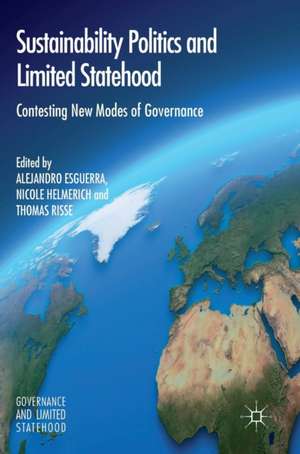Sustainability Politics and Limited Statehood: Contesting the New Modes of Governance: Governance and Limited Statehood
Editat de Alejandro Esguerra, Nicole Helmerich, Thomas Risseen Limba Engleză Hardback – 5 dec 2016
| Toate formatele și edițiile | Preț | Express |
|---|---|---|
| Paperback (1) | 777.50 lei 43-57 zile | |
| Springer International Publishing – 7 iul 2018 | 777.50 lei 43-57 zile | |
| Hardback (1) | 781.62 lei 43-57 zile | |
| Springer International Publishing – 5 dec 2016 | 781.62 lei 43-57 zile |
Din seria Governance and Limited Statehood
-
 Preț: 394.51 lei
Preț: 394.51 lei - 15%
 Preț: 644.95 lei
Preț: 644.95 lei -
 Preț: 397.38 lei
Preț: 397.38 lei -
 Preț: 389.31 lei
Preț: 389.31 lei -
 Preț: 389.11 lei
Preț: 389.11 lei -
 Preț: 388.72 lei
Preț: 388.72 lei - 15%
 Preț: 644.18 lei
Preț: 644.18 lei -
 Preț: 390.63 lei
Preț: 390.63 lei -
 Preț: 391.61 lei
Preț: 391.61 lei -
 Preț: 386.39 lei
Preț: 386.39 lei -
 Preț: 392.97 lei
Preț: 392.97 lei -
 Preț: 389.88 lei
Preț: 389.88 lei -
 Preț: 392.21 lei
Preț: 392.21 lei - 18%
 Preț: 723.51 lei
Preț: 723.51 lei - 18%
 Preț: 723.21 lei
Preț: 723.21 lei -
 Preț: 226.45 lei
Preț: 226.45 lei - 15%
 Preț: 639.08 lei
Preț: 639.08 lei - 18%
 Preț: 727.66 lei
Preț: 727.66 lei
Preț: 781.62 lei
Preț vechi: 953.20 lei
-18% Nou
Puncte Express: 1172
Preț estimativ în valută:
149.56€ • 156.57$ • 123.75£
149.56€ • 156.57$ • 123.75£
Carte tipărită la comandă
Livrare economică 07-21 aprilie
Preluare comenzi: 021 569.72.76
Specificații
ISBN-13: 9783319398709
ISBN-10: 3319398709
Pagini: 242
Ilustrații: XVII, 238 p. 15 illus.
Dimensiuni: 148 x 210 x 20 mm
Greutate: 0.43 kg
Ediția:1st ed. 2017
Editura: Springer International Publishing
Colecția Palgrave Macmillan
Seria Governance and Limited Statehood
Locul publicării:Cham, Switzerland
ISBN-10: 3319398709
Pagini: 242
Ilustrații: XVII, 238 p. 15 illus.
Dimensiuni: 148 x 210 x 20 mm
Greutate: 0.43 kg
Ediția:1st ed. 2017
Editura: Springer International Publishing
Colecția Palgrave Macmillan
Seria Governance and Limited Statehood
Locul publicării:Cham, Switzerland
Cuprins
Chapter 1. Introduction: Sustainability Politics and Limited Statehood. Contesting New Modes of Governance; Alejandro Esguerra, Nicole Helmerich, and Thomas Risse.- PART ONE: NEW MODES OF GOVERNANCE AT THE TRANSNATIONAL LEVEL.- Chapter 2. “A comment that might help us move along”: Brokers in Negotiation Systems; Alejandro Esguerra.- Chapter 3. Let’s Bargain! Setting Standards of Sustainable Biofuels; Philip Schleifer.- PART TWO: SUSTAINABILITY GOVERNANCE IN AREAS OF LIMITED STATEHOOD.- Chapter 4.Between Global and Local Governance: The Critical Ecosystem Partnership Fund in China; Sander Chan, Ayşem Mert, and Philipp Pattberg.- Chapter 5. The State in Private Sustainability Governance: Contestation, Limited Statehood and Forest Certification in Russia; Olga Malets.- Chapter 6. Governing Health and Safety in the Electronics Industry in Malaysia; Gale Raj-Reichert.- Chapter 7. Remnants of Hierarchy: The limits on New Modes of Biodiversity Governance in the Dominican Republic; Casey Stevens.- Chapter 8. Bringing Climate Change Down to Earth: Climate Change Governance from the Bottom Up; Cordula Kropp and Jana Türk.- Chapter 9. Conclusion, Alejandro Esguerra.
Notă biografică
Alejandro Esguerra is a post-doctoral researcher with the research group ‘Wicked Problems, Contested Administration: Knowledge, Coordination, Strategy’ at the University of Potsdam, Germany. His work is concerned with the role of knowledge in international relations theory, transnational private governance, and epistemic authority in global environmental politics.
Nicole Helmerich is a post-doctoral researcher at the Hertie School of Governance in Berlin, Germany. Her work revolves around the role of business in transnational governance, transnational private regulation, corporate responsibility, transnational workers’ rights, and good corporate governance.
Thomas Risse is Professor of International Relations at the Otto Suhr Institute of Political Science at the Freie Universität Berlin, Germany. He is co-ordinator of the Research Center 700 'Governance of Areas of Limited Statehood' and co-director of the Research College 'Transformative Power of Europe', both funded by the German Research Foundation (DFG).
Nicole Helmerich is a post-doctoral researcher at the Hertie School of Governance in Berlin, Germany. Her work revolves around the role of business in transnational governance, transnational private regulation, corporate responsibility, transnational workers’ rights, and good corporate governance.
Thomas Risse is Professor of International Relations at the Otto Suhr Institute of Political Science at the Freie Universität Berlin, Germany. He is co-ordinator of the Research Center 700 'Governance of Areas of Limited Statehood' and co-director of the Research College 'Transformative Power of Europe', both funded by the German Research Foundation (DFG).
Textul de pe ultima copertă
The contributors to this book critically examine the performance of new modes of governance in areas of limited statehood, drawing on a range of in-depth case studies on issues of climate change, biodiversity, and health. The Paris Agreement for Climate Change or the Sustainable Development Goals (SDGs) rely on new modes of governance for implementation. New modes of governance such as market-based instruments, public-private partnerships or stakeholder participation initiatives have been praised for playing a pivotal role in effective and legitimate sustainability governance. Yet, do they also deliver in areas of limited statehood? States such as Malaysia or the Dominican Republic partly lack the ability to implement and enforce rules; their domestic sovereignty is limited. Exploring this perspective on governance, the authors demonstrate that areas of limited statehood are not ungoverned or ungovernable spaces. The book elaborates how and under what conditions new modes of governance emerge in areas of limited statehood, and examines their relative effectiveness.
Caracteristici
Presents a timely study, making use of the two-decade interim between the present and the Rio Earth Summit Focuses on governance in areas of limited statehood, where much of the surrounding literature focuses on countries with consolidated statehood Comparatively analyses and contests sustainability governance in this context, fulfilling a research need


